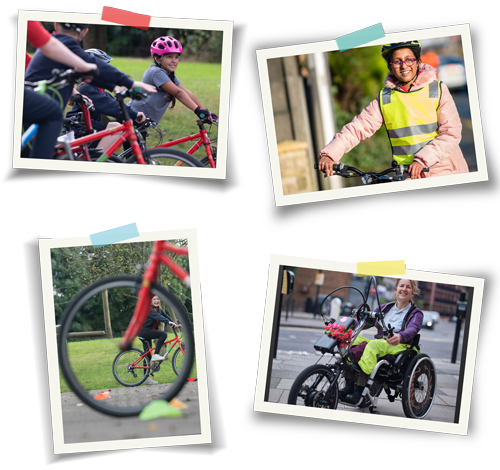Throughout 2021, the Trust continued to strengthen its support of the industry, in order to ensure that cycle training was delivered to a high standard across the country.
This included:
• Financial support
• Business support
• Promotional support
• Continuing professional development
• Support and mentoring
Our promotional film helped industry explain to schools why Bikeability is so important
In addition, we improved the quality of our award materials. All badges are now made in the UK from recycled materials and we removed all single use plastics. Our award materials now better reflect the environmental benefits of cycling and demonstrate another step towards a more sustainable planet.
Our partnership with Beryl Bikes enabled cycle instructors to access free minutes on e-bikes across the country. This enabled instructors and trainees the opportunity to access high-quality, reliable cycles for free.
Case study: Safeguarding support
Safeguarding sits at the heart of our training and our approach to keep families safe. All cycle instructors must hold valid safeguarding training to teach Bikeability. With thousands of instructors working with children every day, we wanted to ensure all instructors felt empowered to respond to child protection concerns with confidence. Our partnership with the NSPCC supported our cycle instructors to easily access the gold standard of safeguarding training. In addition, the 20% discount secured by the Trust allowed instructors to complete this training online, at an affordable cost.

Support and mentoring
“During coronavirus (COVID-19), our external quality assurance (EQA) visits to training providers stopped. To continue to offer support, we piloted a new support and mentoring service. This helped training provider managers focus on areas they, or the Bikeability Trust, identified for improvement, using online 1:1 mentoring sessions. Expert EQA panellists and Bikeability Trust staff offered a core number of hours to support any area of operations, including:
- Internal Quality Assurance (IQA) plan development
- All training providers must provide an IQA plan annually
- Training delivery tools and techniques
- Training provider policies and procedures
- Instructor development
- Instructor management and observation
The pilot worked with 8 training providers. Sessions were flexible, based on the needs of individual training providers. It was wonderful to receive overwhelmingly positive feedback. In particular, training providers told us that they increased their confidence in running their organisation well and they felt better equipped for planning.By the end of the year, 30 training providers had taken part in support and mentoring. This equates to around 15% of the industry taking part.
The pilot programme led to the:
• New framing of quality support, agreed with the Department for Transport (DfT). This included published criteria for support, de-registration and improvement
• Development of new internal quality assurance resources
• Continuation of support and mentoring sessions
It was fantastic to be able to continue to support the industry throughout coronavirus (COVID-19) and ensure they could continue to deliver high-quality cycle training.”
Louise Sanders, Operations Manager
Case study: Rider Characteristics
In 2021, the Trust introduced the compulsory collection of rider characteristics. Rider characteristics report a rider’s gender, ethnicity, SEND and eligibility for pupil premium. This data is a huge step towards the vision to deliver cycle training to every child. It allows us to prove our impact and identify areas of need across the country. Therefore, improving the quality of cycle training across England.
To support our industry, we created and updated the following:
- Model parental consent form
- Model monitoring form for schools
- Letter for schools, explaining the requirements
- Infographic for schools
- In depth webinar, including case studies from Wiltshire Council and The Active Wellbeing Society
There are worries of personal intrusion and that people won’t want to give us this information. We didn’t find this at all. We invested heavily in the training of our staff to explain why it was important for us to have this data. We needed the evidence in order to demonstrate that cycle training should be free.”
Beccy Marston, The Active Wellbeing Society





